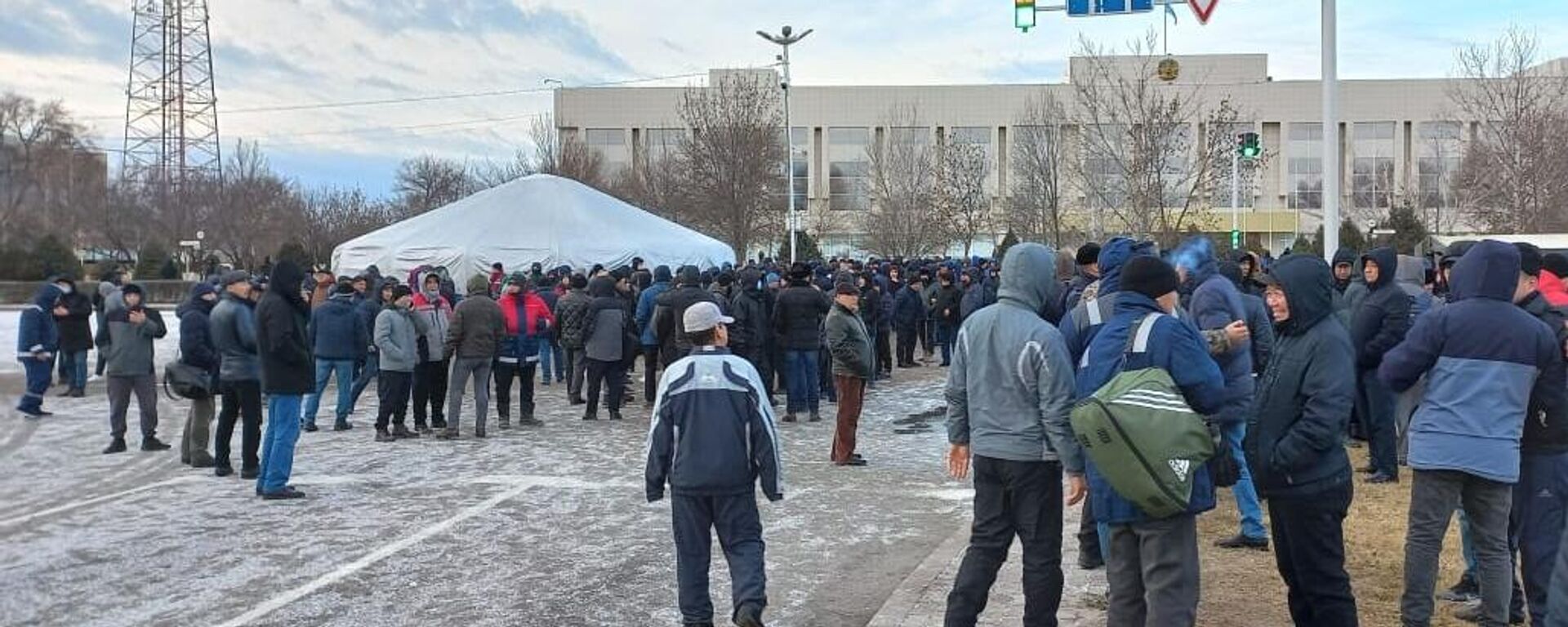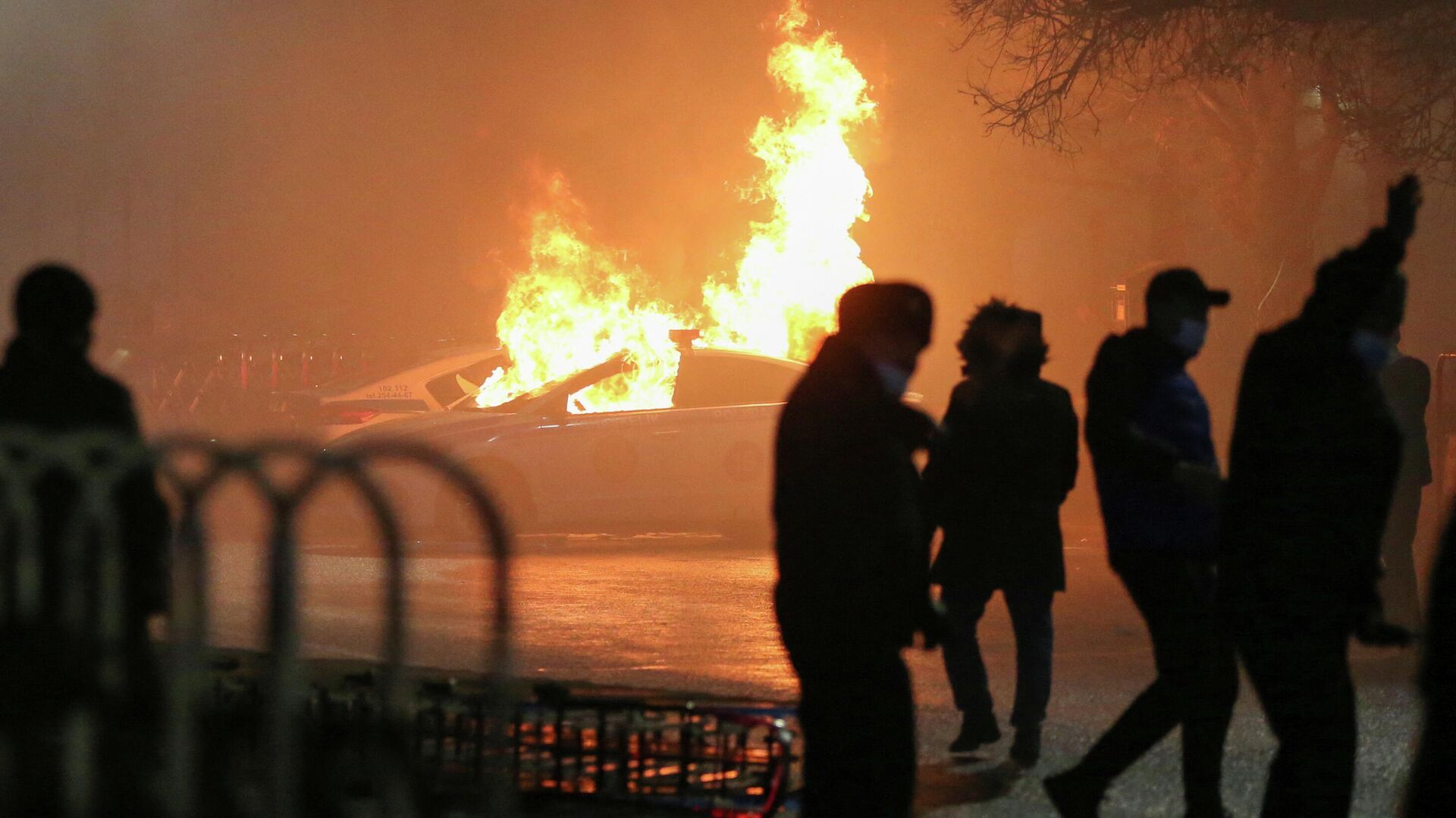https://sputnikglobe.com/20220105/whats-going-on-in-kazakhstan-and-what-are-protesters-demanding-amid-surging-gas-prices-1092033565.html
What's Going on in Kazakhstan and What Are Protesters Demanding?
What's Going on in Kazakhstan and What Are Protesters Demanding?
Sputnik International
Protests in several Kazakh cities erupted on 2 January due to surging gas prices in the country, with clashes between demonstrators and law enforcement officers occurring between late 4 January and early 5 January in the city of Almaty.
2022-01-05T11:16+0000
2022-01-05T11:16+0000
2022-01-06T10:50+0000
protests
asia
demonstrations
kazakhstan
protests in kazakhstan
https://cdn1.img.sputnikglobe.com/img/07e6/01/05/1092034467_0:203:2921:1846_1920x0_80_0_0_1dce3a9fb46da6c64f9422eb96615edf.jpg
As of Wednesday, at least 137 police officers and 53 civilians were injured during mass protests in Almaty, with the country's largest city facing crowds of demonstrators attempting to storm the mayor's office as law enforcement officers try to hold them back.The mayor's office has been set on fire by the protesters, and gunshots have also been heard near the building, according to a Sputnik correspondent reporting from the scene.Several videos have since emerged on social media appearing to show protesters storming the mayor's office, with some entering the building, and another group reportedly heading to the old presidential residence.It has been estimated that there are around three thousand people attempting to storm the mayor's office. Law enforcement officers are using light grenades, along with sticks and shields, to hold the protesters back.What Do the Protesters Want?The ongoing unrest in Kazakhstan has been ignited by a surge in gas prices that followed the government's new liquified gas pricing policy. Since 1 January, prices have skyrocketed, initially rising from around 60 tenges to 80 and then up to 120 tenges (around $3) per litre, prompting the residents of Aktau and Zhanaozen in the southwestern Mangystau Region to take to the streets, demanding the prices be lowered.The economy of these southwestern regions of the country is closely tied to oil and gas, and this is not the first time unrest has erupted in the area. In 2011, Zhanaozen saw a mass demonstration of people engaged in the sector that escalated into deadly protests and claimed 15 lives and left hundreds injured.Now, the very same region is seeing mass protests again, with the calls to lower gas prices evolving into political demands such as introducing elections for the heads of the nation's regions and cities and the return of the 1993 Constitution.Gov't ResponseShortly after the protests erupted, Kazakh President Kassym-Jomart Tokaev ordered a commission to resolve the issue, with the government promising to lower gas prices. On Wednesday, Tokaev accepted the resignation of Prime Minister Askar Mamin, underlining that "the government was especially to blame for allowing a protest situation". Aside from this, the president ordered the state regulation of liquefied gas (LNG) prices for six months.It was earlier announced that Kazakhstan will postpone the transition to the sale of LNG through an electronic trading platform for one year. The authorities have also been tasked with conducting an investigation into price collusion and other "anti-competitive actions" in the sale of liquefied gas.Local media outlets in Kazakhstan reported that the head of the Mangystau gas processing plant was detained for allegedly increasing gas prices for no reason. Additionally, the head of an electronic trading platform was also reportedly detained.Recent DevelopmentsDespite the government's promises regarding gas prices, the protests have spread from the southwest to large cities, including the capital Nur-Sultan. A state of emergency was introduced in the regions of Almaty and Mangystau, where the protests originated, and is expected to remain in place until 19 January. The Kazakh capital Nur-Sultan later on Wednesday also declared a state of emergency.Later in the day, a state of emergency was declared across all of Kazakhstan.Currently, Almaty appears to be the flashpoint of the Kazakh protests, with clashes between protesters and law enforcement officers continuing. Aside from the mayor's office, Almaty's prosecutor's office was also set on fire, according to a Sputnik correspondent.The unrest has undermined the work of public health services, with protesters injuring medics and even storming into hospitals. According to public health authorities in Almaty, 5 ambulance workers were injured during the unrest, and 2 ambulance vehicles have been destroyed.Across the country, over 200 people have been detained, the Interior Ministry said on Wednesday.
https://sputnikglobe.com/20220105/live-updates-over-200-people-detained-in-fuel-price-protests-in-kazakhstan-1092031106.html
kazakhstan
Sputnik International
feedback@sputniknews.com
+74956456601
MIA „Rossiya Segodnya“
2022
News
en_EN
Sputnik International
feedback@sputniknews.com
+74956456601
MIA „Rossiya Segodnya“
Sputnik International
feedback@sputniknews.com
+74956456601
MIA „Rossiya Segodnya“
kazakhstan, protests in kazakhstan, almaty, situation in kazakhstan, nur-sultan, gas prices in kazakhstan, gas protests, government resigned in kazakhstan,
kazakhstan, protests in kazakhstan, almaty, situation in kazakhstan, nur-sultan, gas prices in kazakhstan, gas protests, government resigned in kazakhstan,
What's Going on in Kazakhstan and What Are Protesters Demanding?
11:16 GMT 05.01.2022 (Updated: 10:50 GMT 06.01.2022) Protests in several Kazakh cities erupted on 2 January due to surging gas prices in the country, with clashes between demonstrators and law enforcement officers occurring between late 4 January and early 5 January in the city of Almaty.
As of Wednesday, at least 137 police officers and 53 civilians were injured during mass protests in Almaty, with the country's largest city facing crowds of demonstrators attempting to storm the mayor's office as law enforcement officers try to hold them back.
The mayor's office has been set on fire by the protesters, and gunshots have also been heard near the building, according to a Sputnik correspondent reporting from the scene.
Several videos have since emerged on social media appearing to show protesters storming the mayor's office, with some entering the building, and another group reportedly heading to the old presidential residence.
It has been estimated that there are around three thousand people attempting to storm the mayor's office. Law enforcement officers are using light grenades, along with sticks and shields, to hold the protesters back.
What Do the Protesters Want?
The ongoing unrest in Kazakhstan has been ignited by a surge in gas prices that followed the government's new liquified gas pricing policy. Since 1 January, prices have skyrocketed, initially rising from around 60 tenges to 80 and then up to 120 tenges (around $3) per litre, prompting the residents of Aktau and Zhanaozen in the southwestern Mangystau Region to take to the streets, demanding the prices be lowered.
The economy of these southwestern regions of the country is closely tied to oil and gas, and this is not the first time unrest has erupted in the area. In 2011, Zhanaozen saw a mass demonstration of people engaged in the sector that escalated into deadly protests and claimed 15 lives and left hundreds injured.
Now, the very same region is seeing mass protests again, with the calls to lower gas prices evolving into political demands such as introducing elections for the heads of the nation's regions and cities and the return of the 1993 Constitution.
Shortly after the protests erupted, Kazakh President Kassym-Jomart Tokaev ordered a commission to resolve the issue, with the government promising to lower gas prices.
On Wednesday, Tokaev accepted the resignation of Prime Minister Askar Mamin, underlining that
"the government was especially to blame for allowing a protest situation". Aside from this, the president ordered the state regulation of liquefied gas (LNG) prices for six months.
"Calls to attack civilian and military offices are completely illegal", Tokaev said. "It is a crime! Power will not fall! We do not need conflict, but mutual trust and dialogue".
It was earlier announced that Kazakhstan will postpone the transition to the sale of LNG through an electronic trading platform for one year. The authorities have also been tasked with conducting an investigation into price collusion and other "anti-competitive actions" in the sale of liquefied gas.
Local media outlets in Kazakhstan reported that the head of the Mangystau gas processing plant was detained for allegedly increasing gas prices for no reason. Additionally, the head of an electronic trading platform was also reportedly detained.

5 January 2022, 06:30 GMT
Despite the government's promises regarding gas prices, the protests have spread from the southwest to large cities, including the capital Nur-Sultan.
A state of emergency was introduced in the regions of Almaty and Mangystau, where the protests originated, and is expected to remain in place until 19 January. The Kazakh capital Nur-Sultan later on Wednesday also declared a state of emergency.
Later in the day, a state of emergency was declared across all of Kazakhstan. Currently, Almaty appears to be the flashpoint of the Kazakh protests, with clashes between protesters and law enforcement officers continuing. Aside from the mayor's office, Almaty's prosecutor's office was also set on fire, according to a Sputnik correspondent.
The unrest has undermined the work of public health services, with protesters injuring medics and even storming into hospitals. According to public health authorities in Almaty, 5 ambulance workers were injured during the unrest, and 2 ambulance vehicles have been destroyed.
Across the country, over 200 people
have been detained, the Interior Ministry said on Wednesday.



